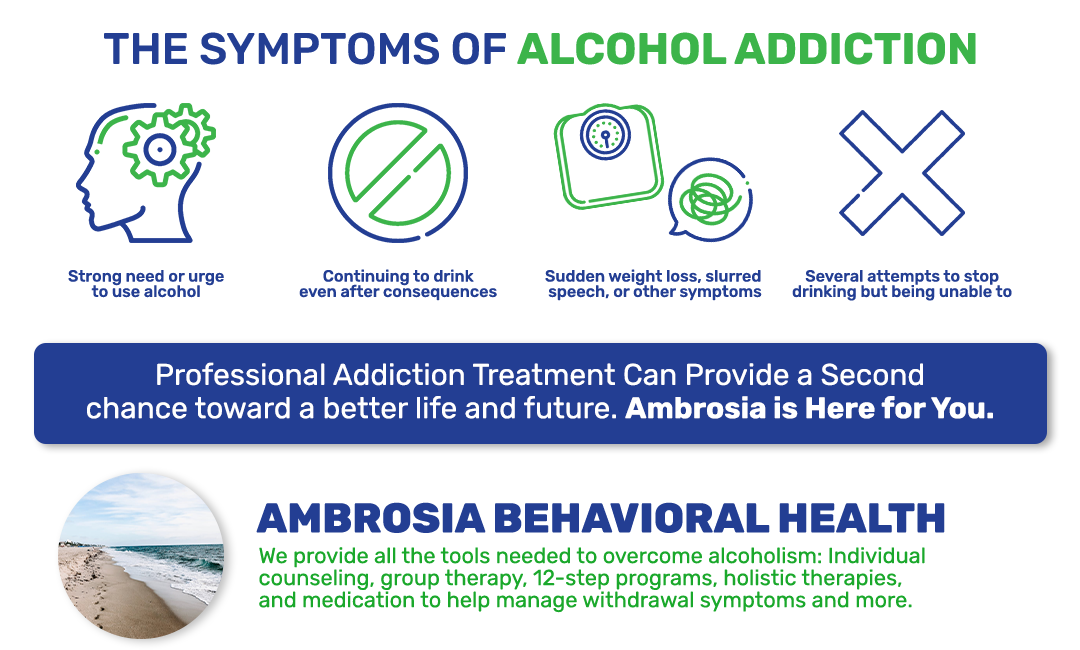Alcohol Rehab in South Florida
Addiction comes in all sorts of shapes and sizes. While some suffer from prescription drug abuse, others may deal with cocaine addiction. Regardless, many people are suffering from substance abuse in South Florida, especially those with an alcohol addiction. Rehab is imperative for those suffering from alcoholism.
At Ambrosia Behavioral Health in West Palm Beach, Port St. Lucie, and Singer Island, Florida, we offer alcohol addiction treatment including our inpatient treatment and outpatient treatment programs.
https://www.ambrosiatc.com
People with alcohol addiction often struggle to quit drinking because of the physical and psychological dependence they have developed on alcohol. They may find it hard to cut down their consumption or stop altogether due to cravings and withdrawal symptoms. These symptoms make it difficult to quit consuming alcohol.
Additionally, alcohol-dependent people may not recognize that their drinking patterns are problematic, or they may be in denial about their situation. For those who do want to stop drinking, there can be a range of psychological and emotional barriers that make it difficult to stay on track. These can include feelings of guilt, shame, anxiety, depression, and loneliness.
The American Society of Addiction Medicine utilizes four criteria to define alcoholism:
- Lack of control
- Obsession
- Consequences
- Denial
Those who grapple with this disease have difficulty controlling their alcohol intake, are overly preoccupied (or “obsessed”) with the acquisition and consumption of alcohol, experience consequences directly related to their drinking behaviors, and are in denial that their behaviors are problematic. At Ambrosia Treatment Center, our treatment programs help individuals discover the underlying issues, create sustainable change, and recover from the devastating effects of alcoholism.
What is Binge Drinking?
Binge drinking is most common in college students and the 18 to 24-year-old age group, however, it is something that affects people of all ages. That is why alcohol rehab in West Palm Beach is open for adults of all ages.
Signs of binge drinking in both women and men include the following:
- Drinking excessively on the weekends
- Becoming irritable or anxious after a night out
- Deciding on how many drinks to consume but drinking more than that total amount
- Blacking out frequently
- Developing health problems related to binge drinking
- Always binge drinking when consuming alcohol
- Negative effects on one’s personal and/or professional life due to drinking
The NIAAA reports that nearly 30% of individuals 30 and older binge drink each month. They also report that about 13% of people ages 12 to 20 binge drink. Unfortunately, many people who consume alcohol regularly and those who binge drink also face additional dangers if they combine their alcohol with prescription and/or over-the-counter medications.
How Does Alcohol Addiction Impact Men and Women?

Based on available data, men are significantly more susceptible to developing alcohol addiction compared to women. Some estimates indicate that men are up to four times more likely to struggle with alcoholism than women. This is supported by a NIAAA report, which highlights that out of the 88,000 individuals who die annually from alcohol-related causes, 62,000 are men and 26,000 are women. Alcoholism can also cause physical impairments such as impaired vision, kidney damage, and liver cirrhosis.
Alcohol use and related harms between males and females in the United States have significantly decreased over the last century. Although males still consume more alcohol and experience more alcohol-related injuries and deaths than females, the gaps are narrowing. Among adolescents and emerging adults, the drinking gaps have narrowed primarily due to a decline in alcohol use among males. Among adults, alcohol use is increasing for women but not for men.
At Ambrosia Behavioral Health we provide mental health treatment for men and women, offering a dual diagnosis program to treat co-occurring disorders.
Risks of Drinking Too Much
Professional treatment options, such as rehabilitation programs, may be recommended to help address underlying issues and begin the process of sobriety. In addition to medical care, other aspects of treatment are extremely helpful. For example, this could mean sober support groups, counseling, and lifestyle changes can all play a role in aiding one’s recovery.
It is also important for men to recognize the physical and mental toll that alcohol addiction can have on their lives. Regular drinking can lead to poor performance at work, strained relationships, and financial struggles. In severe cases, long-term use may result in organ damage or even death due to liver failure or other health complications.
Rates of alcohol-related emergency department visits, hospitalizations, and deaths have all increased among adults over the past two decades, with larger increases for women. Recent studies also suggest that females are more susceptible than males to alcohol-induced health issues, including liver inflammation, cardiovascular disease, memory blackouts, hangovers, and certain cancers. There is a need for prevention strategies that address the increases in alcohol consumption and unique health risks for women.

What is Alcohol Addiction Treatment?
The goal of treatment is to help individuals gain a better understanding of their addiction and learn to manage their drinking habits without turning to alcohol as a coping mechanism. Treatment involves learning healthier ways to cope with feelings of stress, anxiety, depression, loneliness, and low self-esteem that can often lead to alcohol misuse. People in treatment may also gain the skills and support needed to make changes that can last over time, including lifestyle modifications, improved communication, and problem-solving skills.
Many people find success in alcohol addiction recovery with professional help. Going through a comprehensive treatment program is often the best way to achieve long-term recovery from alcohol addiction. Treatment centers are staffed by experienced professionals who can provide individualized care in a safe and supportive environment. Treatment programs may also offer additional support such as medical detoxification, relapse prevention planning, and aftercare services to ensure individuals have the tools they need for lasting sobriety.
The Ambrosia Behavioral Health Difference
Our program also focuses on relapse prevention strategies, allowing individuals to build up the necessary skills and knowledge needed to make lasting change. We believe that every individual can heal and recover from addiction, regardless of their background or circumstances. With the right support and guidance, any man can overcome his alcohol addiction and lead a healthier life.
Why is Specialized Treatment Essential for People Struggling with Alcohol Addiction?
When seeking out a treatment program for alcohol addiction, men should look for one that has experienced counselors and clinicians who have dealt with similar cases in the past. A qualified team of professionals can help create an effective plan to address any underlying issues or triggers that may contribute to alcohol addiction. Furthermore, it is important to find a program that offers both individual and group counseling, as well as addiction therapy services and alternative therapies such as art and music therapy. This can be beneficial in boosting morale and providing an environment conducive to recovery.


Why Do I Need Alcohol Rehab in West Palm Beach?
Alcohol is not a substance that can be abused without causing consequences. The reality of the situation is that struggling with an alcohol use disorder can and will impact your life in several ways. You may experience effects that are both short and long-term, such as legal issues, chronic health conditions, or damage to personal relationships. There are some effects and risks you may face simply as a result of your alcohol use disorder. However, detox and addiction intervention can help.
Part of the problem with alcoholism is related to time. The longer that you drink, the more damage that accrues. However, other issues are immediate and they can harm you even if you are early on in your alcoholism. That is why alcohol rehab in West Palm Beach can help even if a person has only been drinking for a short amount of time.
The most severe of all risks tied to alcoholism is alcohol poisoning. This is a life-threatening condition that occurs when someone drinks to excess and overwhelms the central nervous system. When this happens, a person’s body temperature drops, respiratory rate slows, and vomiting may occur, which can lead to choking. Without the proper medical attention, alcohol poisoning is often fatal. But, even if you do not experience alcohol poisoning, there are still several risks that are associated with alcohol abuse and addiction, including the following short-term problems:
- Physical and/or verbal arguments
- Unprotected sex
- Legal repercussions
- Unemployment
- Motor vehicle accidents
Some of the most common effects associated with alcoholism include motor vehicle accidents and DUIs. Alcohol impairs driving ability significantly, which is why driving with a blood alcohol level (BAC) of 0.08% or higher can lead to a DUI. When your BAC reaches this point, your concentration and cognitive abilities decrease, all while you struggle to maintain your ability to reason. If you receive a DUI, you could face one or more of the following repercussions:
- Paying a fine
- Doing time in jail
- Community service
- Take alcohol education classes
Many of the effects and risks covered so far reflect what can happen while inebriated. However, those who find themselves drinking to excess and for longer periods can develop long-term effects and face severe risks to their overall well-being. Each year, approximately 88,000 Americans lose their lives to a health issue related to alcohol use. The many different types of disease that can contribute to that total most frequently include the following:
- Depressive Disorders
- Cancer
- Bone disease
- Heart disease
- Immune system disease
- Nerve disease
- Pancreatitis
- Stomach ulcers
Alcohol rehab in West Palm Beach also offers help with co-occurring mental health disorders. Often, mental health conditions develop as a result of long-term alcoholism. In addition, sometimes, a person uses alcohol to cope with an underlying mental health disorder.
Of the many health-related complications that often turn life-threatening, complications with the liver are by far the most common. The liver processes every bit of alcohol that you consume, as it is the role of this organ to filter fluids in the body. However, regular exposure to alcohol can cause the liver to experience chemical changes and dehydration that can lead to severe, potentially fatal outcomes. Unfortunately, most individuals are unable to tell that their liver needs help until about 75% of it is damaged. At this point, signs that something is wrong can become extreme.
- Exhaustion
- Anorexia
- Jaundice
- Distended abdomen
- Bruising
- Confusion
Liver disease may be a condition that many people consider to impact long-haul alcoholics, but studies show that age is not always a defining trait. Experts say that liver disease is rising in people between the ages of 25 and 34. While some liver complications can be treated, many can result in death, which is the most costly of all consequences caused by alcoholism.
It is a common misconception that these effects, especially the long-term effects, do not apply to people who drink alcohol, but not on a 24/7 basis. These effects can occur in those who abuse alcohol in different ways, such as through binge drinking. At this point, someone may need detox before things worsen.

Contact Ambrosia to Start Your Recovery from Alcohol

Dr. Alam is an internationally renowned psychiatrist with academic affiliations with Northwestern University and University of Illinois, Chicago where he completed his residency training. He has been a principal investigator for over forty studies and has been involved in research leading to the approval of most psychiatric medications currently on the market. He is the founder of the Neuroscience Research Institute which continues to conduct research on cutting edge medication and interventional psychiatry. Dr. Alam is a Distinguished Fellow of the American Psychiatric Association and the American Society of Addiction Medicine. He has won several awards and has been featured extensively on radio and television.







